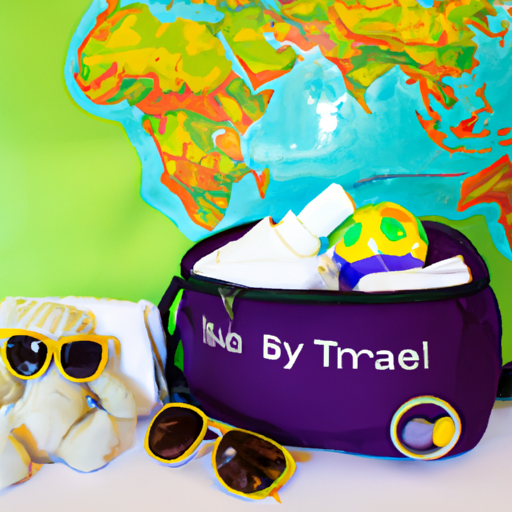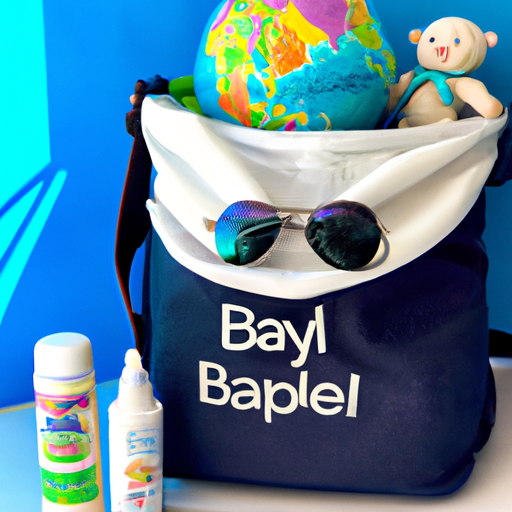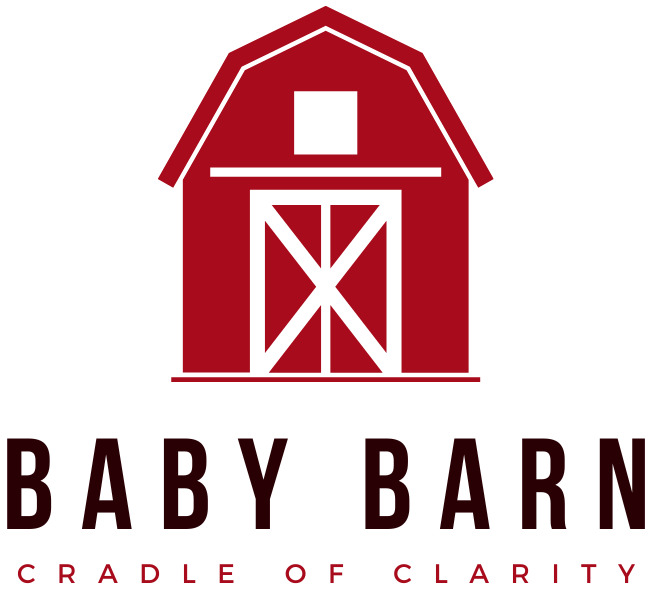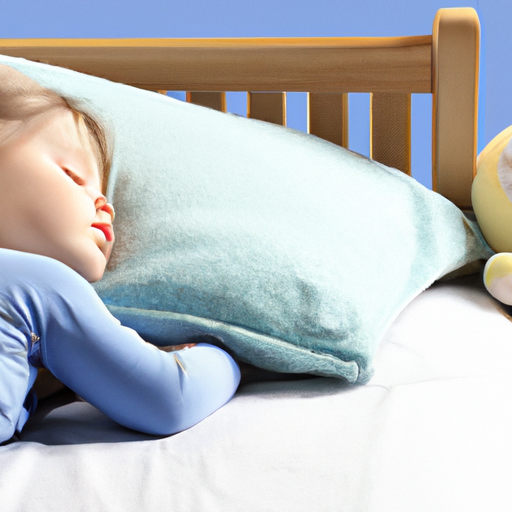In this article, you will discover essential tips for traveling with babies. We will explore how to make your journey smoother and more enjoyable for both you and your little one. From packing essentials to navigating airport security, you will learn practical strategies to ensure a stress-free travel experience. Whether you’re taking a short road trip or embarking on a long flight, these tips will help you create lasting memories while keeping your baby comfortable and happy.

Preparation
When it comes to traveling with a baby, preparation is key. From packing essentials to organizing travel gear and securing necessary documents, these steps are crucial for a smooth and stress-free trip.
Packing essentials for the baby
Packing for a baby can be overwhelming, but with a little planning, it can be a breeze. Start by making a list of the essentials your baby will need during the trip. This includes diapers, wipes, formula or breast milk, bottles, baby food, clothing, blankets, and any special toys or comfort items. Remember to pack extra of everything to account for unexpected situations.
Preparing necessary documents
Before embarking on your journey, make sure you have all the necessary documents for your baby. This includes a valid passport or identification card, travel insurance, and any required vaccinations or medical records. It’s also a good idea to carry a letter from your pediatrician stating any specific medical conditions or allergies your baby may have.
Organizing baby’s travel gear
Keeping your baby’s travel gear organized will make your life much easier while on the go. Invest in a diaper bag or backpack with multiple compartments to keep everything organized. Pack essentials such as diapers and wipes in easy-to-access pockets, and use separate compartments for clothing and food items. This will save you time and frustration when you need to find something quickly.
Choosing the Right Mode of Transportation
Choosing the right mode of transportation is an important decision when traveling with a baby. Each mode of transport has its pros and cons, so consider these factors before making a decision.
Considering pros and cons of different modes
When it comes to transportation, there are several options to choose from – car, train, bus, or plane. Each mode has its advantages and disadvantages. For example, traveling by car allows for more flexibility and control over the journey, but it can also be tiring and time-consuming. On the other hand, flying may be quicker, but it comes with the challenges of security checks and limited space. Consider what works best for your baby and your family.
Planning for long journeys
If you’re embarking on a long journey, it’s important to plan ahead and be prepared. Schedule breaks for diaper changes, feeding, and stretching for both you and your baby. Research child-friendly rest stops along the way and plan your route accordingly. Additionally, having some entertainment options such as toys or books can help keep your baby occupied during the journey.
Tips for flying with a baby
Flying with a baby can be a daunting experience, but with a little preparation, it can be a smooth ride. Choose a flight that fits your baby’s schedule, preferably during nap time or when they’re most relaxed. Pack a carry-on bag with all the essentials you’ll need during the flight, including diapers, wipes, a change of clothes, and snacks. Consider bringing a baby carrier or sling to keep your hands free while navigating through the airport. Lastly, don’t forget to bring soothing items such as pacifiers or comfort blankets to help keep your baby calm during takeoff and landing.
Accommodation and Safety
When traveling with a baby, it’s important to select accommodation that is baby-friendly and ensures a safe environment. Consider these factors when choosing where to stay.
Selecting baby-friendly accommodations
Before booking accommodation, do some research to find hotels or resorts that are baby-friendly. Look for amenities such as cribs, high chairs, and baby-proofed rooms. If possible, choose a lodging option that offers separate sleeping areas for you and your baby. This will allow you to have some privacy and uninterrupted sleep, even if your baby wakes up during the night.
Ensuring a safe environment for the baby
Once you arrive at your accommodation, take the time to babyproof the space. This includes covering electrical outlets, removing any hazardous items or sharp objects, and securing furniture that could be a tipping hazard. Check that the windows and balcony doors are safely locked, and use bed rails or a portable crib to create a safe sleeping environment for your baby.
Tips for babyproofing the travel space
If you’re staying in a rental property or someone else’s home, it’s important to babyproof the travel space as well. Bring along outlet covers, cabinet locks, and corner protectors to make the space safe for your little one. Pay attention to any potential hazards such as cords or loose furniture, and take the necessary steps to make them baby-friendly.

Maintaining Baby’s Routine
One of the most important aspects of traveling with a baby is maintaining their routine. By planning the itinerary around their schedule and ensuring regular feeding and nap times, you can help keep your baby happy and content during the trip.
Planning itinerary around baby’s schedule
When planning your travel itinerary, try to work around your baby’s routine as much as possible. Stick to their regular sleeping and eating times, and plan activities or sightseeing during their most awake and alert hours. This will help minimize disruptions to their routine and prevent them from becoming overtired or cranky.
Tips for feeding and nap times
Whether you’re breastfeeding or bottle-feeding, it’s important to maintain your baby’s regular feeding schedule while traveling. If you’re breastfeeding, find comfortable and discreet places to nurse your baby. Carry a nursing cover or scarf to nurse in public if you prefer more privacy. If you’re using formula, make sure to bring enough for the duration of your trip, and carry a bottle warmer or thermos to heat the water for formula preparation.
Nap times are equally important for your baby’s well-being. Create a calm and familiar environment for nap times, whether it’s in your hotel room or in a stroller while exploring. Make sure your baby is comfortable and has all their usual sleep cues, such as a pacifier or a favorite blanket.
Keeping baby entertained during travel
Traveling can be exciting and stimulating for your baby, but it’s important to keep them entertained and engaged. Pack a few travel-friendly toys, such as soft books or interactive toys, to keep your baby occupied during transit. Singing songs, playing games like peek-a-boo, or simply talking and interacting with your baby can also help keep them entertained and happy.
Keeping the Baby Comfortable
Ensuring your baby is comfortable during the trip is crucial for their well-being and enjoyment. From dressing appropriately for the weather to managing diaper changes and creating a comfortable sleeping environment, these tips will help keep your baby comfortable on the go.
Dressing appropriately for the weather
When it comes to dressing your baby for travel, consider the weather at your destination and dress them in layers. This way, you can easily adjust their clothing as needed to keep them comfortable. Carry a few extra layers in your diaper bag in case the weather changes unexpectedly.
Tips for managing diaper changes
Diaper changes are inevitable during travel, so be prepared with all the essentials. Pack enough diapers, wipes, and diaper rash cream for the duration of your journey. Carry a portable changing pad or disposable changing pads for when you need to change your baby in public places. If possible, plan your diaper changes during breaks or when you’re at your accommodation to ensure a clean and comfortable space for your baby.
Ensuring a comfortable sleeping environment
A comfortable sleeping environment is essential for your baby’s well-being and quality sleep during travel. If you’re staying in a hotel or rental property, bring along a portable crib or a travel bassinet for your baby to sleep in. Make sure the bedding is clean and comfortable, and try to recreate the sleep environment your baby is used to at home by using their familiar sleep cues, such as a favorite stuffed animal or a sleep sack.
Health and Hygiene
When traveling with a baby, it’s important to prioritize their health and hygiene. Pack essential medications and first aid supplies, maintain hygiene on-the-go, and be prepared for possible emergencies.
Pack essential medications and first aid supplies
Before you leave for your trip, make sure to pack any essential medications your baby may need. This includes prescription medications, over-the-counter remedies for common ailments such as fever or teething, and any other specific medications recommended by your pediatrician. Additionally, carry a basic first aid kit with items such as band-aids, antiseptic wipes, and thermometer.
Maintaining hygiene on-the-go
Maintaining proper hygiene while traveling is crucial for your baby’s health. Carry hand sanitizer or wipes to clean your hands before handling your baby’s food or after using public facilities. When it comes to meal times, ensure that the utensils and bottles you use are properly washed and sterilized. Wipe down high chairs or surfaces before placing your baby in them, and avoid letting your baby put anything dirty or unsanitary in their mouth.
Preparing for possible emergencies
Although we hope that emergencies don’t happen, it’s always better to be prepared. Research the nearest hospitals or medical facilities at your destination, and have the contact information readily available. Carry a copy of your baby’s medical records, including any allergies or existing conditions, and inform your travel companions or hotel staff about any specific requirements your baby may have.
Dealing with Jet Lag and Time Zone Changes
When traveling across different time zones, both you and your baby may experience jet lag and disruption to your sleep schedule. Here are some tips to help minimize the impact and help your baby adjust to the new time zone.
Minimizing the impact of jet lag
Jet lag can be challenging for both adults and babies, but there are ways to minimize its impact. Try to gradually adjust your baby’s sleep schedule a few days before your trip by shifting their nap and sleep times closer to the timezone you’ll be in. Once you arrive at your destination, expose your baby to natural light as much as possible during the day to help regulate their internal clock. Establish a bedtime routine that cues your baby it’s time to sleep, such as a warm bath or reading a bedtime story.
Helping baby adjust to new time zones
Babies may take some time adjusting to a new time zone, so be patient and understanding. Stick to their regular routine as much as possible during the transition period, and offer comfort and reassurance when needed. If your baby wakes up during the night, keep the lights dim and avoid stimulating activities to help them differentiate between day and night.
Tips for managing sleep disruptions
Sleep disruptions are common when traveling with a baby, especially during the adjustment period. To help manage sleep disruptions, create a soothing sleep environment for your baby. Use blackout curtains or blinds to minimize any external light that may disturb their sleep. Use white noise machines or apps to drown out any unfamiliar noises that may disrupt their sleep. Stick to their regular bedtime routine to provide familiarity and signal that it’s time to sleep.
Engaging and Stimulating the Baby
While traveling, it’s important to engage and stimulate your baby to keep them entertained and happy. Here are some tips for creating an interactive travel experience for your little one.
Travel-friendly toys and activities
Pack travel-friendly toys and activities that will keep your baby engaged and stimulated during transit or downtime. Soft books, teething toys, and small sensory toys are great options for babies. Consider bringing along interactive toys that encourage fine motor skills and exploration. Remember to choose toys that are age-appropriate and safe for your baby.
Creating an interactive travel experience
Traveling offers a unique opportunity for your baby to discover new sights, sounds, and experiences. Point out interesting landmarks or animals that you come across during your travels. Engage your baby in conversation by describing what you’re seeing or experiencing. Encourage them to touch or explore their surroundings when it’s safe to do so. By creating an interactive travel experience, you’re not only entertaining your baby, but also fostering their curiosity and cognitive development.
Encouraging sensory exploration
Traveling exposes your baby to a variety of sensory experiences. Take advantage of this by encouraging sensory exploration. Let your baby feel different textures, such as sand at the beach or grass in a park. Play with water or natural elements like leaves or sticks. These sensory experiences enhance your baby’s brain development and provide a rich learning experience.
Interacting with Locals and Other Travelers
When traveling with a baby, it’s important to consider cultural considerations, connect with other families, and engage with locals for a more authentic experience.
Cultural considerations when traveling with a baby
Different cultures may have different attitudes and customs when it comes to babies and children. It’s important to research and understand the cultural norms of your destination to ensure you’re respectful and considerate. For example, some cultures may not be accustomed to seeing babies in certain places or may have different expectations regarding discipline. By being mindful of the local culture, you can ensure a positive and respectful experience for everyone.
Connecting with other families
Traveling with a baby can sometimes feel isolating, but connecting with other families on the road can provide a sense of community and support. Look for family-friendly activities or events, such as playgrounds or parent-and-child classes, where you can meet other parents and babies. Online forums or social media groups can also be a great resource for connecting with other like-minded families who are traveling with babies.
Engaging with locals for a more authentic experience
Interacting with locals can offer a deeper understanding of the culture and enrich your travel experience. Engage in conversations with locals, ask for recommendations on family-friendly activities or restaurants, and be open to learning about their customs and traditions. You may discover hidden gems or unique experiences that you wouldn’t have found otherwise. Just remember to be respectful and courteous in your interactions.
Conclusion
Traveling with a baby can be challenging, but it also provides a unique opportunity for bonding and creating lasting memories. By following these essential tips and preparing ahead of time, you can ensure a smooth and enjoyable trip for both you and your baby. Embrace the adventure, appreciate the quality time spent together, and enjoy the journey. Happy travels!





